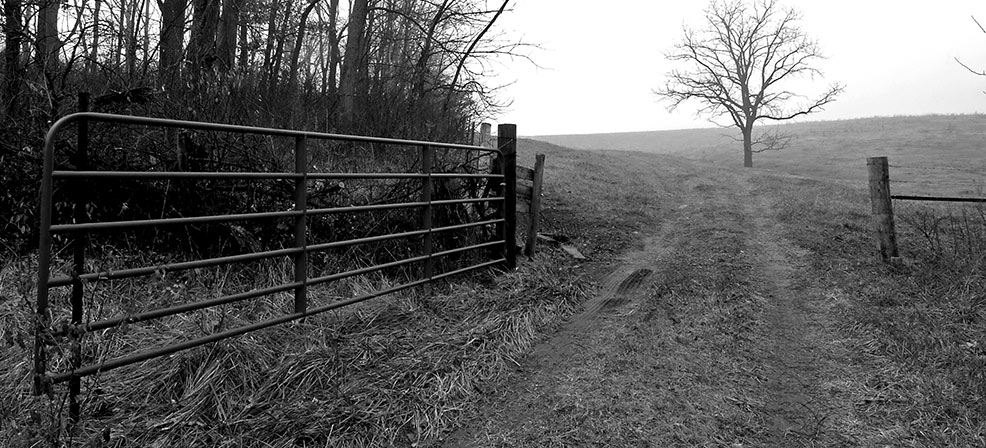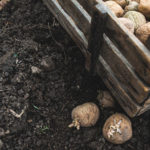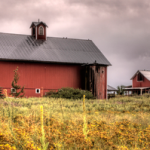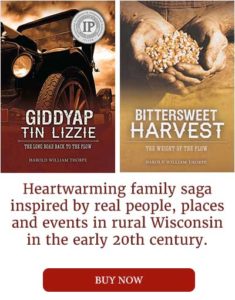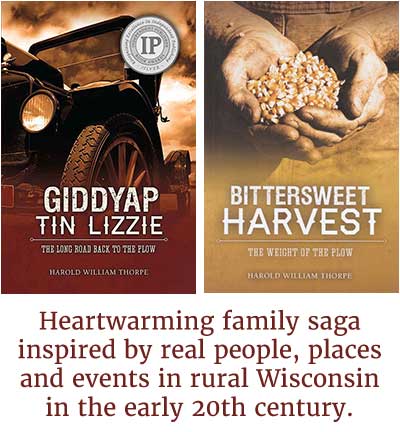We Move to the Farm
>> Download this outtake as a PDF >>
October, 1935
I knew that Dad’s business, like everyone’s business, wasn’t doing so well, but when Ruby told me we were going to leave Ashley Springs and go live on a farm, I was flabbergasted.
“Are you sure?” I asked her.
“Yep. Sharon’s throwing a conniption. Says she won’t go.”
I liked visiting Grandma and Grandpa O’Shaughnessy’s farm. I loved the open spaces. I loved running across a field, my hair streaming behind, and the breeze in my face. Most of all, I loved the animals. But that was when I was little, and now I was almost ten years old. “Do you think we’ll have lambs and baby pigs, too?”
“I don’t think Dad wants pigs,” Ruby said. She frowned. “I’ll miss my friends.”
Mother had delivered a freshly baked cake to our next door neighbor, and because she wanted us to help her tie a new feather tick, she’d told us to stay near until she got back. We took turns swinging on the front gate while waiting for her return.
She shrugged her shoulders and looked back as she swung away on the gate. “Oh fiddle-dee-dee, I’ll get new friends soon enough.”
I wasn’t so sure. All my friends lived in Ashley Springs, friends I’d played with all my life. I loved the town’s hills, its old houses, and its many stores. I loved walking down the valley road to visit my best friend, Jessica Treleven. I’d look up the hill to where the mines had been and remembered stories about how the Cornish women beckoned their men from outside their houses, shaking a white cloth to call them home for supper. “Would you believe,” I once said to Jessica, “they called them home with a dishrag?”
I giggled at the thought.
“What’s so funny, sis?” Ruby said. “Sharon doesn’t think it’s funny. She says she’s going to stay here with Cousin Emma. I’ll miss her terribly if she stays behind.”
“She wouldn’t do that, would she? She wouldn’t leave us.”
But we’ll be leaving our family, won’t we? I loved the grove of O’Shaughnessies that clustered in our neighborhood. I could visit Grandma and Grandpa or play tricks on Cousin Joe. I’d pound on his door and then hide behind the hedge when he came to see who was there. He’d pretend to be surprised, mutter a complaint, and act as if he didn’t know what happened. Then he’d sneak out the back and around the house to catch me when I returned to pester him again. He’d chase me down the street toward home, screaming like a banshee, pretending he was angry because I tricked him. What fun! “I’ll miss Grandma and Grandpa. Cousin Joe will be sad. Do you think they’ll come visit?”
“It’s a long way. Further than you’ve ever gone.”
“I’ll miss my friends, too.”
I tobogganed with friends in winter. We tied our sleds together to make a train that shot down snowy hills like a runaway engine down a mountainside. In summer I attended concerts at the band shell and played spin-the-bottle and chalk-the-arrow. I never told anyone that Joe DeMuth kissed me after he stopped the bottle with his foot. It was just a flick on the cheek. But thinking about it made me blush. He wasn’t like the other St. Mary boys. He was nice. Now it would be over. I supposed it was decided and there was no turning back. I wasn’t sure whether to be sad or glad.
“You’ll find new friends,” Ruby said. “You’ll forget about Ashley Springs soon enough.”
And I supposed that I would.
I thought about the animals. I knew we’d have animals to care for, and I loved animals. Maybe we’d have a gaggle of geese. I giggled at the thought. I liked that word. It circled my throat before it flipped off my tongue. “Gaggle. Gaaaggle,” I said aloud. I’d have a gaggle of new friends.
* * *
And then it was here, that long day’s journey to the river. Mother was nervous, but resolute. She’d never been a farmer, and now, leaving our beautiful home in Ashley Springs, she must have been frightened. But it never showed. I think her faith gave her hope, and she surely loved Dad. And I could tell that Dad was excited. This was his dream. But I don’t think he knew what he was getting into. Sharon was scared to death. She never wanted to leave Ashley Springs, but she had some of Mother’s self-control, so she tried not to show her fear. Ruby was as enthusiastic as a newborn kitten. But Ruby was always exuberant. And for me it was a grand adventure. If it was good for Ruby, I figured it was good for me, too.
* * *
February, 1936
We started the day early. My dad and his friends Bert Whitford, Dennis Newberry, Charlie Nesbit, and Rich Turner brought five sleds, one for the family and four full of furniture and belongings. I’d never seen so many big horses. And they were beautiful, too. Dad said they were Belgians, all eight of them, all but our two horses, Ted and Ned. And we also had Fanny, Mabel, and Fanny Too. They weren’t big enough to pull loads on these steep hills, but I loved them like family. And they were family. Dad even said so.
We were snug with blankets wrapped around us, and we had soap stones at our toes that Dad had heated overnight. We drove through the woods, over the hills, and down into deep valleys. At first I was scared going downhill because the horses slipped and the sled skidded sideways, but soon I forgot all else but the beauty around me. The trees had early morning frost clinging to their bare trunks and branches, and I imagined they were bearded sentries standing guard so no wild animal or fierce stranger would block our way or savage us in our sleigh.
From high atop each hill I could see a winding stream below. I remembered that Mrs. Day had told us that most of these Southwest Wisconsin creeks made their way to the Wisconsin River which emptied into the Mississippi River at Prairie du Chien. Then the water flowed far south and emptied into the Gulf of Mexico at a place called New Orleans. I’d travel there some day if I could convince Ruby to go along. But she liked adventure, too, so I didn’t think that would be a problem.
When we reached level spots high up in the woods, Dad reined in the horses and let us out to stretch our legs. When all the sleighs and horses came together among these trees, I imagined we were a wagon train gathering for the trip across the prairies. I remembered Dad telling about Great-Grandpa O’Shaughnessy coming from New York through the eastern forests in a covered wagon. But I shivered at the thought. Dad said that Great-Grandpa died of pneumonia a stone’s throw from his new home, but I didn’t want to think about that.
When we stopped in the thickest woods, our cat, Emily, jumped from Sharon’s arms and ran into the trees. I was certain she’d get eaten by a wolf or a bear, but Ruby was after her and out of sight before I could jump from the sleigh.
“Ruby, where are you?” I called into the trees.
I heard a clamor through the underbrush and headed in that direction.
Ruby’s voice greeted my ears before I saw either her or the cat. “Emily, come down from there.”
And when I got there, Emily sat on a low branch while Ruby tried to shinny up the tree, but the slippery bark caused her to slide back faster than she could pull herself up.
“Sis, help me,” Ruby called.
And I knew what to do. Many a time I’d bent my knees and cupped my hands for her to step up to higher levels, and this time I thought if I lifted hard, I could get her to that branch. And I did, but barely. Ruby held on by her fingertips, but when she tried to walk up the trunk, she had no better luck than when she climbed from the ground. It was just too slippery.
“Stand back, sis.”
When I moved out of her way she switched her hands on the branch and spun around so that she faced toward Emily, who crouched at the end. Then she swung her legs back and forth like she was on a jungle gym and hooked her ankles around the limb. Now hanging by her hands and feet, she secured her grip and pulled herself atop the branch. She grabbed Emily and scooted back along the branch to the trunk, and then reached her down to me.
“You naughty cat,” I said. “You’d better learn to stay near or some big bad wolf is going to eat you up.” I decided that when we got to our new home I’d better read her the story of Red Riding Hood again. She didn’t have a very long memory, it seemed.
We continued through the hills and valleys all day long. Then about the time I thought we’d never get there, Dad called back, “We’re almost to the river. Then it’s only another ten miles on the level.”
But when we started down the last hill, the sky darkened, and soon, I couldn’t see anything around me. I knew it wasn’t night yet, but it was almost as dark. The air was moist and foggy, and it clung to my face and arms. It was a fog thicker than any I’d ever experienced before. “Daddy, will we be okay?”
“Yes, my dear, but we’ll have to go slow. We don’t want to plunge into the river.”
So I stopped worrying about wolves and bears and started thinking about giant fish like I’d seen in Dad’s National Geographic. But I didn’t think about them for long. The foggy woods felt like a dream where, for moments, I caught glimpses of strange creatures emerging from the fog, and then I saw nothing at all. I thought of Alice’s Adventures in Wonderland and expected to see the Cheshire Cat or the March Hare around each corner, or maybe Tweedledum and Tweedledee. What a wonderful adventure!
And then we were at our new home. And an animal greeted us, but he wasn’t strange at all. I jumped off the sleigh and bounced up the porch steps to take his extended paw. And this time, Ruby trailed behind.
I called Teddy my Holstein dog. Like our cows, he was silky white and covered with black splotches. He was an English sheep dog, about the size of a collie. And he was the best friend you could possibly have. We learned that a few times. If it wasn’t for Teddy, the Jenkins brothers’ life-lines would have been lots shorter.
Photo by Terry McNeil. See more of Terry’s work on his Capture Wisconsin profile.

